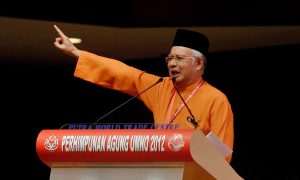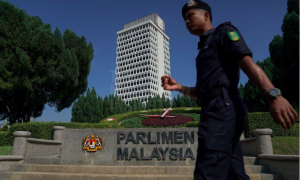Last week, it became clear that the perception that Najib has huge public support is false.
Mapping out elections for victory
Electoral changes recently rammed through parliament can mean winning power at GE14 with just 16.5% of the popular vote. But would such elections confer the legitimacy to rule?
The People’s Tribunal on GE13
The People's Tribunal's found that that there are systemic flaws in the laws, processes and institutions entrusted to manage elections in Malaysia.
Malaysian elections, malapportionment, and redelineation
If the next redelineation exercise does not address malapportionment, it may be the end of reconciliation efforts
MASSA 2013 – second call for papers
Malaysia and Singapore Society in Australia Colloquium 2013 -- extended deadline for abstracts.
Rural votes in Malaysia
Rural votes the saviour of UMNO? Another analysis on how malapportionment and gerrymandering is distorting Malaysia's electoral outcomes.
Clive Kessler’s analysis on UMNO’s strategy and a correction
Clive Kessler's analysis of Najib Razak's campaign strategy had obviously struck the nerve of some very powerful people.
Malaysia’s GE13: What happened, what now? (part 2)
With great powers, comes great responsibility. Can the now clearly and explicitly dominant UMNO exercise good judgement?
Malaysia’s GE13: What happened, what now? (part 1)
The real campaign all along was about the Malay votes on the peninsula.
Malaysian women parliamentarians: why the different numbers?
The lack of concern on these numbers is indicative of how ingrained our belief that women’s issues are trivial.
Revisiting “democracy in plural societies” in transforming Malaysia
Regime change in itself will not automatically bring the powerful state down, writes Kikue Hamayotsu
Bersih’s impact on GE13
The critical question remains whether Bersih’s concerted efforts will actually bring some, if any institutional reform to Malaysia’s electoral system and process.
GE13 and the politics of urban chauvinism
Politicians everywhere would be wise to examine their own shortcomings in addressing the needs and aspirations of rural constituents
Whither UMNO’s neo-feudalism
Younger Malays, in general, both in rural and urban areas, are no longer emotionally attached to UMNO.
Najib’s tightrope act
The dilemma for BN is abundantly clear with a risk of further alienating the already disgruntled moderate Malays and non-Malays.
GE13 Malaysia – Kikue Hamayotsu
BN’s greatest strength is their ability to sustain massive party machines and patronage networks in order to generate loyalty.
Pakatan Rakyat must rethink strategies
Barisan Nasional has managed to pocket 60 percent or 133 out of the total 222 seats by winning only 48 percent of the popular votes.
The “Rakyat Tsunami” in Sabah
The results in Sabah showed the changing political ground even as the influence of the politics of development remained strong.
Al-Qardawi’s ‘vote’ in GE13: Does it matter?
If there is one impact of Islam on the Muslim electorate is that leaders who have neglected Islamic ideals of good governance will be removed.
How Malays voted at GE13
The new breed of Malays have their eyes now set on cosmopolitan leaders, regardless of which party they are from.
Observations from Malaysia’s 2013 elections
Professor Ed Aspinall shares his views on Malaysia's general elections.
Ghosts to citizens
The excrement that we dispose of quietly and in private is the very same substance that nurtures our national body.
Islam at GE13
The main Islamic-related issues that are currently at the center of electoral discourse are: “Hudud”, the “Allah” controversy, and “Islamic Unity.”
 Facebook
Facebook  Twitter
Twitter  Soundcloud
Soundcloud  Youtube
Youtube  Rss
Rss 

